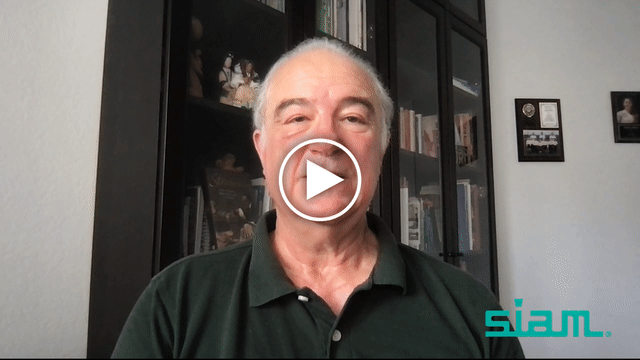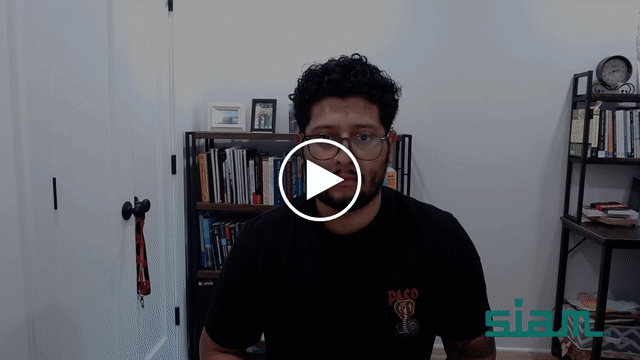In honor of National Hispanic Heritage Month, SIAM is shining a light on the achievements of Hispanic and Latin American mathematicians within our community throughout September and October. Learn more about them below and check out a list of resources and networks for Hispanic and Latin American mathematicians.
Alicia Prieto Langarica
Dr. Alicia Prieto Langarica is a Distinguished Professor in the department of mathematics and statistics and the Director for Academic Programs at the Sokolov Honors College at Youngstown State University. She received her undergraduate degree in applied mathematics from the University of Texas at Dallas in 2008 and her Ph.D. from the University of Texas at Arlington in 2012, where she was President of the SIAM Student Chapter. Her research is in the intersection of mathematics and biology, specifically problems related to the medical field. Recently, she started conducting research in data science and public policy. Dr. Prieto Langarica has been an active SIAM member for seven years, most recently serving as a mentor in the SIAM-Simons Undergraduate Summer Research Program in the summer of 2023.
Watch the video below to learn more about Dr. Prieto Langarica and her research and listen to her advice to early career professionals.

Vanessa Lopez-Marrero
Dr. Vanessa Lopez-Marrero is a computational scientist with the Computational Science Initiative at Brookhaven National Laboratory, and an affiliate at the Institute for Advanced Computational Science at Stony Brook University. Dr. Lopez-Marrero is also a member of the Advanced Scientific Computing Advisory Committee that provides independent scientific advice to the U.S. Department of Energy.
Prior to joining Brookhaven Lab, she was a research staff member in the mathematical sciences department at the IBM Thomas J. Watson Research Center. In her early career, Dr. Lopez-Marrero held postdoctoral appointments at the University of Illinois at Urbana-Champaign (UIUC) and at Lawrence Berkeley National Laboratory. She holds a Ph.D. in scientific computing from UIUC, with a Certificate of Specialization in computational science and engineering, a B.A. in mathematics from Rutgers University, and a B.B.A. in computer information systems from the University of Puerto Rico, Río Piedras.
Dr. Lopez-Marrero’s research interests lie generally in computational and applied mathematics, dynamical systems, and modeling and numerical simulation of complex systems. She has expertise in the numerical solution of partial differential equations (i.e., initial/boundary value problems; deformation of moduli spaces of solutions of Lie group invariant PDEs via numerical continuation), numerical linear algebra, and inverse problems. Recently, she has started working on problems dealing with measure transport, as well as scientific machine learning. Learn more about Dr. Lopez-Marrero.
Dr. Lopez-Marrero has continued to be a SIAM member for the past 24 years because of the SIAM’s commitment to and support of the applied and computational mathematics community. She shares that “SIAM does a great job at furthering high-quality research through the intellectually stimulating journals and conferences; through great SIAM books, of which I own several from the Classics in Applied Mathematics series; and through their engagement with the community, students, and researchers at all ranks and career levels.” Further, Dr. Lopez-Marrero looks forward to her upcoming term serving on the SIAM Education Committee in January 2024.
And as a word of advice to early career researchers, she suggests “keeping true to yourself, following your heart without losing your objectivity, and to never stop caring about the work you do.”
Fabio Milner
Dr. Fabio Milner is a professor of applied mathematics and mathematics education in the school of mathematical and statistical sciences at Arizona State University (ASU). He grew up in Argentina, received his M.S. and Ph.D. in mathematics from the University of Chicago, and was an assistant, associate, and full professor at Purdue University. As well as a professor at the University of Tor Vergata in Rome, Italy, and at the University of Puerto Rico Mayagüez. At ASU, Dr. Milner held the position of Director of Mathematics for STEM Education (2008-2022) and Associate Dean for Graduate Initiatives (2018-2022), and he is currently the Simon A. Levin Mathematical, Computational and Modeling Sciences Center Director at ASU.
Dr. Milner’s research in numerical analysis was centered on mixed finite element methods for elliptic and parabolic PDEs. In mathematical biology, his research focuses on demography, population dynamics, epidemics, immunology, tumor growth, and optimization of cancer treatment. He also conducts research in mathematics education, focused on understanding the cognitive difficulties for learning algebra and calculus, and how to modify pedagogy to mitigate them.
Dr. Milner is a lifetime member of SIAM, as well as the American Mathematical Society, the Society for Mathematical Biology, the Mathematical Association of America, and the Society for the Advancement of Chicanos and Native Americans in Science (SACNAS), where he is also the secretary of the Executive Committee and member of the Board of Directors. He has been involved with SIAM since his student years, and has published research in several SIAM journals, as well co-authoring the SIAM book, Gender-Structured Population Modeling: Mathematical Methods, Numerics, and Simulations. Additionally, Dr. Milner is a member of the Graduate Faculty Council of the National Math Alliance for Doctoral Programs, where he mentors undergraduate students from underrepresented groups and helps them choose and apply for admission to graduate programs in applied math, computational science, data science, statistics, and biostatistics.
Watch the video below to learn more about Dr. Milner and his research and listen to his advice to early career professionals.

Arnaldo Rodriguez-Gonzalez
Dr. Arnaldo Rodriguez-Gonzalez is currently a postdoctoral fellow in the Sibley School of Mechanical and Aerospace Engineering at Cornell University, where he works on revamping the university's mechanical engineering curriculum while doing research in topological dynamics and chaos theory. He was born and raised in Puerto Rico, earning his B.S. in mechanical engineering from the University of Puerto Rico at Mayagüez and then his Ph.D. in theoretical and applied mechanics from Cornell, where he worked on applications of dynamical systems theory to low-Reynolds number hydrodynamics.
The broad aim of Dr. Rodriguez-Gonzalez’s research is to develop and extend mathematical methods for analyzing how things change over time, particularly when it comes to proving that the way in which those things are changing is particularly complex. Right now, he is working on improving tools in the field of symbolic dynamics to handle the analysis of mixing and chaos on continua.
As part of his efforts to see more people like himself join his field and the scientific community in general, Dr. Rodriguez-Gonzalez likes to help out future Puerto Rican leaders in mechanical engineering, applied mathematics, and physics by providing one-on-one feedback and mentorship as they go through their undergraduate education; so, they can make informed decisions about what to study and how to best pursue their career aspirations of choice.
Dr. Rodriguez-Gonzalez shared that he first heard about SIAM as he was in the process of publishing some work on boundary-layer theory in 2019. He was very proud of that work, as it was his first foray into purely mathematical writing but was concerned that the nature of the work—curiosity-driven, pedagogical, and written with an emphasis on clarity, not formality—would preclude it from being accepted into a mathematical journal. Luckily, SIAM Review proved him wrong! And in doing so, SIAM crucially showed Dr. Rodriguez-Gonzalez that there was a space for the kind of work he’s interested in doing, as well as encouragement to be the kind of mathematician he’d like to be, in academic mathematics. Furthermore, Dr. Rodriguez-Gonzalez having the opportunity to show his later work at the SIAM Conferences on the Applications of Dynamical Systems (DS21 and DS23), and having that community receive him and his research so warmly, played no small part in him still doing work in applied mathematics today.
In an effort to give advice to early career researchers, Dr. Rodriguez-Gonzalez paraphrases a line from the U.S. TV series, Mad Men: “A person is whatever room they’re in.” He continues to emphasize that one should pick carefully what rooms they choose to be in throughout their career.
“Many people have the impression that, with enough willpower, they can transform even the most negative environments or institutions into something that fits their own subjective interpretation of good, but the transformation is never one-way,” Dr. Rodriguez-Gonzalez said. “That work chips at you; even the victories make you more defensive, and less trusting; it makes you more reliant on the power of orthodoxy and authority, since you yourself are becoming an authority; and the small concessions and simple compromises can add up quickly to transform you into something that you may not easily recognize in the mirror.”
Dr. Rodriguez-Gonzalez also encourages early career professionals to “always urgently seek out spaces that reinforce the best parts of you; to find or build spaces that make you feel safe and welcome, free of gatekeeping; and to put effort into sustaining and improving those spaces too, instead of just focusing on fixing the negative ones. Always prioritize smiles, and laughter, and happiness—that is why any of us do anything, after all.”
Steven Noel Rodriguez
Dr. Steven Rodriguez is a staff researcher in the Computational Multiphysics group at the U.S. Naval Research Laboratory. His primary research area is reduced-order modeling, which focuses on developing mathematical, numerical, and computational frameworks to accelerate high-fidelity simulations and enable HPC caliber simulations on a laptop. Dr. Rodriguez's work spans a wide range of reduced-order modeling applications, such as accelerating additive manufacturing, hypersonics, magneto-hydrodynamics, multiphase and free-surface flows, and elasto-plastic simulations. He graduated with his Ph.D. in 2018 from Lehigh University under the advisement of Professor Justin Jaworski, where his research focused on stability analysis and computational fluid dynamics of helical vortex dynamics in rotorcraft applications. Prior to joining the U.S. Naval Research Laboratory, Dr. Rodriguez held a visiting scientist position at the University of Washington hosted by Professor Steve Brunton. He also held internships at the NASA Langley Research Center and the California Institute of Technology/NASA Jet Propulsion Laboratory, where he worked on structural acoustics research and on the Mars 2020 rover. Dr. Rodriguez became a SIAM member in 2023 as part of the MGB-SIAM Early Career Fellowship cohort and is a member of the SIAM Activity Group on Computational Science and Engineering.
Watch the video below to learn more about Dr. Rodriguez and his research and listen to his advice to early career professionals.

Resources
Below are some resources and networks that may be of interest to Hispanic and Latin American mathematicians and early career professionals.